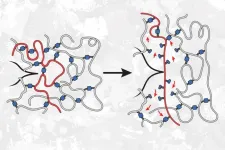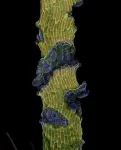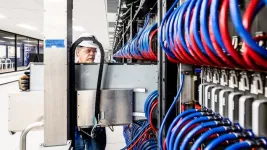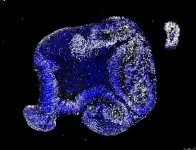(Press-News.org) Based on genetic blueprints, individual amino acids are assembled into long amino acid chains, the proteins, in the protein factories of our cells, the ribosomes. Each newly formed protein starts with the amino acid methionine. This amino acid is often split off again during protein synthesis, as soon as the growing amino acid chain leaves the protein factory through the "ribosomal tunnel". In these cases, the excision of methionine is essential to ensure the subsequent function of the corresponding proteins in the cell.
The enzymes causing this cleavage are already known. According to their function, they are called methionine aminopeptidases (METAPs). Up to now, it was unclear how METAPs come into contact with the protein factories and, just at the right place and moment, cause the excision of methionine from specific proteins. Biologists Elke Deuerling, Martin Gamerdinger and their team from the University of Konstanz (Germany), together with Nenad Ban and his colleagues from ETH Zurich (Switzerland), have now shed light on the subject. The results published in Science show: access of METAPs to protein factories is controlled by a "ribosomal gatekeeper" called NAC (short for "nascent polypeptide-associated complex").
More extensive function than previously known
Only last year (2022), the team led by Deuerling and Gamerdinger was able to elucidate that NAC performs an important sorting function at the ribosomal tunnel: "We were able to show that NAC sits in front of the tunnel exit like a gatekeeper. There it controls the transport of proteins to the endoplasmic reticulum (ER) – the membrane network inside the cell – by specifically bringing together protein and transport molecule (SRP)," Deuerling summarizes the previous study results. In their new study, the researchers now show that the gatekeeper's sorting function is more extensive and even more significant than previously known, and that NAC also ensures the correct methionine excision from nascent proteins.
In proteins transported to the ER, the first amino acid methionine is part of a transport signal. "Methionine excision in these proteins would destroy the signal and thus prevent its transport into the cell's membrane network, which would inevitably lead to cell death," Gamerdinger explains. How these transport signals are prevented from being destroyed by METAPs was a major scientific puzzle the scientists from Konstanz and Zurich have now solved: The gatekeeper NAC forms a complex with METAP1 and the ribosome at the exit of the ribosomal tunnel. Only within this complex can the enzyme cause the excision of methionine from newly formed proteins.
This changes as soon as a protein with a transport signal leaves the ribosomal tunnel. Interactions between the protein's signal sequence and NAC then cause the gatekeeper to change its own position at the ribosomal tunnel. As a result, METAP1 loses its binding to NAC and thus its ability to cleave off methionine. With the changed position of the gatekeeper, a new binding interface becomes accessible for the transport molecule SRP. "This mechanism means that proteins lacking signal sequences can be specifically modified by methionine excision. Those, in contrast, that are transported to the endoplasmic reticulum, remain unaffected by METAP1," Gamerdinger explains.
The gatekeeper as a mediation all-rounder?
The researchers hypothesize that NAC may have other similar mediating functions at the ribosomal tunnel, thus assuming the role of a general molecular control centre. "There is a large number of enzymes and transport molecules that, like METAP1 and SRP, interact with the nascent proteins already during protein synthesis. Future studies will therefore have to show whether NAC also plays a role in regulating other processes that are vital for the function of our cells," says Deuerling.
.
Key facts:
EMBARGOED UNTIL THURSDAY, 22 JUNE 2023, 20:00 CEST (19:00 LONDON TIME, 14:00 U.S. EASTERN TIME)
Original publication: M. Gamerdinger et al. (2023) NAC controls cotranslational N-terminal methionine excision in eukaryotes. Science; doi: 10.1126/science.adg3297
International research team from Konstanz and Zurich expands existing model on the functional mechanism of the "ribosomal gatekeeper" NAC
Funding: German Research Foundation (DFG), Swiss National Science Foundation (SNF), European Research Council (ERC)
Note to editors:
You can download images here:
https://www.uni-konstanz.de/fileadmin/pi/fileserver/2023/das_molekulare_kontrollzentrum_abbildung.jpg
Caption: Sorting mechanism of the ribosomal gatekeeper NAC
Image: Martin Gamerdinger
https://www.uni-konstanz.de/fileadmin/pi/fileserver/2023/das_molekulare_kontrollzentrum_ag.jpg
Caption: The team at the University of Konstanz (from left to right): Laurenz Rabl, Katrin M. Khakzar, Elke Deuerling, Martin Gamerdinger, Renate Schlömer, Kay Diederichs, Gundula Huneus
Image: Deuerling Lab
END
The molecular control centre of our protein factories
Researchers from Konstanz and Zurich have deciphered a biochemical mechanism that ensures that newly formed proteins are processed correctly when they leave the cell's own protein factories. This solves a decade-old puzzle in protein sorting.
2023-06-22
ELSE PRESS RELEASES FROM THIS DATE:
Surprise! Weaker bonds can make polymers stronger
2023-06-22
CAMBRIDGE, MA -- A team of chemists from MIT and Duke University has discovered a counterintuitive way to make polymers stronger: introduce a few weaker bonds into the material.
Working with a type of polymer known as polyacrylate elastomers, the researchers found that they could increase the materials’ resistance to tearing up to tenfold, simply by using a weaker type of crosslinker to join some of the polymer building blocks.
These rubber-like polymers are commonly used in car parts, and they are also often used as the “ink” for ...
The clue is in the glue - Nature’s secret for holding it together
2023-06-22
An obscure aquatic plant has helped to explain how plants avoid cracking up under the stresses and strains of growth.
The finding by researchers Dr Robert Kelly-Bellow and Karen Lee in the group of Professor Enrico Coen at the John Innes Centre, started with a curious observation in a dwarf mutant of the carnivorous plant Utricularia gibba.
The stems of this floating plant are filled with airspaces and this hollowness means that the vascular column inside the stem can buckle when under stress. This effect would not be apparent in most plants, which have solid stems.
The researchers saw that in a dwarf mutant the central column was wavy instead of straight. They hypothesised that ...
Generative AI models are encoding biases and negative stereotypes in their users
2023-06-22
The likes of ChatGPT, Google’s Bard and Midjourney can also help spread incorrect, nonsensical information
Marginalised groups are disproportionately affected
Children are at particular risk
In the space of a few months generative AI models, such as ChatGPT, Google’s Bard and Midjourney, have been adopted by more and more people in a variety of professional and personal ways. But growing research is underlining that they are encoding biases and negative stereotypes in their users, as well as mass generating and spreading seemingly accurate but nonsensical information. Worryingly, marginalised groups are disproportionately affected by the fabrication of this nonsensical information.
In ...
Bringing the power of "multiplex" imaging to clinical pathology
2023-06-22
June 22, 2023, NEW YORK – Researchers at the Ludwig Center at Harvard have developed a platform technology for imaging that enables integration of the methods of microscopic analysis long employed in pathology laboratories with the visualization of multiple molecular markers in individual cells that is now rapidly advancing in research labs. The latter capability, known as “multiplex” imaging, promises to revolutionize cancer diagnostics by exposing molecular traits associated with ...
NF researchers, clinicians and patients gather for annual conference in Scottsdale
2023-06-22
From June 21 through June 27, the largest gathering of NF researchers, clinicians, and patients in the world will take place at the Fairmont Scottsdale Princess in Scottsdale, Arizona. NF is a group of genetic disorders that causes tumors to grow on nerves throughout the body, and affects 1 in 2,000 births of all populations equally. As such, NF affects millions worldwide, but is underrecognized. While there is one approved treatment for a small subgroup of NF patients with plexiform neurofibromas, there is no cure yet, and the vast majority of NF patients face serious health issues because of the condition. ...
Argonne installs final components of Aurora supercomputer
2023-06-22
The installation of Aurora’s 10,624th and final “blade” marked a major milestone for the highly anticipated exascale supercomputer at the U.S. Department of Energy’s (DOE) Argonne National Laboratory.
After years of diligent work and planning, the system now contains all the hardware that will make it one of the most powerful supercomputers in the world when it is opened up for scientific research. Built by Intel and Hewlett Packard Enterprise (HPE), Aurora will be theoretically capable ...
Being able to tell parents about sexuality plays important role in mental health of Black sexual minority men and transgender women
2023-06-22
Black sexual minority men (BSMM) and transgender women (BTW) face racial and sexuality-based discrimination, and disproportionately high depression compared to Black heterosexual men and Black cisgender women, respectively. Though previous studies have demonstrated the relationship between discrimination and depression among racial and sexual minorities, few studies explore the extent to which openness with parents impacts this relationship.
A new study by College of Public Health Assistant Professor Rodman Turpin found that sexual identity ...
Transforming Anthropology joins the University of Chicago Press journals program in 2024
2023-06-22
We are honored to announce that Transforming Anthropology will join the University of Chicago Press journals program beginning in 2024 (vol. 32, no. 1). Transforming Anthropology is the flagship journal of the Association of Black Anthropologists (ABA), which is a section of the American Anthropological Association (AAA). All 8,000+ members of the AAA receive online access to Transforming Anthropology through their membership, and that benefit will continue in this new partnership.
“Thanks to the vision and dedication of our editor, Aisha Beliso-De Jesús, the journal will maintain its tradition of supporting and nurturing ...
Lehigh Industrial Assessment Center to expand into regional energy audit, workforce development role
2023-06-22
The Lehigh University Industrial Assessment Center (IAC) will expand into the Mid-Atlantic Regional IAC Center of Excellence (MARICE) with newly awarded funding from the U.S. Department of Energy (DOE).
Lehigh’s IAC was established in 2001 as part of the DOE’s nationwide Industrial Assessment Center Program to reduce energy and waste and enhance productivity for manufacturing plants in Pennsylvania, New Jersey, and New York. The center, which was most recently renewed in 2021, is led by mechanical engineering and mechanics (MEM) faculty Professor Alparslan ...
Stem cell model of human brain development suggests embryonic origins of Alzheimer’s disease
2023-06-22
Alzheimer's disease (AD) mainly affects the older population. Recent research found early disease signs in cell culture models of early human brain development, raising the possibility that the disease has its origins much earlier in life, possibly during embryogenesis – the formation and development of an embryo.
Alzheimer’s disease is a highly prevalent, debilitating, and potentially fatal neurodegenerative disease with limited treatment options. Patients are typically diagnosed at an advanced disease stage, limiting the possibilities for early therapeutic intervention. Although for most patients ...
LAST 30 PRESS RELEASES:
Scientists discover why we know when to stop scratching an itch
A hidden reason inner ear cells die – and what it means for preventing hearing loss
Researchers discover how tuberculosis bacteria use a “stealth” mechanism to evade the immune system
New microscopy technique lets scientists see cells in unprecedented detail and color
Sometimes less is more: Scientists rethink how to pack medicine into tiny delivery capsules
Scientists build low-cost microscope to study living cells in zero gravity
The Biophysical Journal names Denis V. Titov the 2025 Paper of the Year-Early Career Investigator awardee
Scientists show how your body senses cold—and why menthol feels cool
Scientists deliver new molecule for getting DNA into cells
Study reveals insights about brain regions linked to OCD, informing potential treatments
Does ocean saltiness influence El Niño?
2026 Young Investigators: ONR celebrates new talent tackling warfighter challenges
Genetics help explain who gets the ‘telltale tingle’ from music, art and literature
Many Americans misunderstand medical aid in dying laws
Researchers publish landmark infectious disease study in ‘Science’
New NSF award supports innovative role-playing game approach to strengthening research security in academia
Kumar named to ACMA Emerging Leaders Program for 2026
AI language models could transform aquatic environmental risk assessment
New isotope tools reveal hidden pathways reshaping the global nitrogen cycle
Study reveals how antibiotic structure controls removal from water using biochar
Why chronic pain lasts longer in women: Immune cells offer clues
Toxic exposure creates epigenetic disease risk over 20 generations
More time spent on social media linked to steroid use intentions among boys and men
New study suggests a “kick it while it’s down” approach to cancer treatment could improve cure rates
Milken Institute, Ann Theodore Foundation launch new grant to support clinical trial for potential sarcoidosis treatment
New strategies boost effectiveness of CAR-NK therapy against cancer
Study: Adolescent cannabis use linked to doubling risk of psychotic and bipolar disorders
Invisible harms: drug-related deaths spike after hurricanes and tropical storms
Adolescent cannabis use and risk of psychotic, bipolar, depressive, and anxiety disorders
Anxiety, depression, and care barriers in adults with intellectual and developmental disabilities
[Press-News.org] The molecular control centre of our protein factoriesResearchers from Konstanz and Zurich have deciphered a biochemical mechanism that ensures that newly formed proteins are processed correctly when they leave the cell's own protein factories. This solves a decade-old puzzle in protein sorting.




